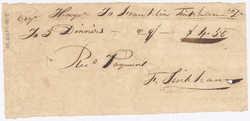Conceived as a way to provide free, open access to three of Maine Historical Society's most significant archival collections, the Beyond Borders project digitally draws together information and tools traditionally used by academic researchers—including finding aids, collections databases, scholarly articles—and combines them with rich interpretive content designed for a broader public audience.

Draper's claim northeast of Bath, 1795
Maine Historical Society
In 2020, Maine Historical Society (MHS) was awarded a nearly $350K National Endowment for the Humanities, Historic Collections and Reference Resources grant to support its Beyond Borders project, aimed at digitizing and providing enhanced access for three distinct, yet related, archival collections. The presentation enhanced with contextual essays, introduces themes and topics, while facilitating a progressively deeper study of Maine history from multiple perspectives.
The Plymouth Company records—also known as the Kennebec Proprietors (Coll. 60), the Proprietors of the Township of Brunswick papers—referred to as the Pejepscot Proprietors (Coll. 61) and the Thomas Barclay collection—informally called the Northeast Boundary collection (Coll. 26) each document the emergence of Maine as a unique and independent entity, distinct from British colonial rule, Massachusetts, the Canadian maritimes, and the United States federal government.
The included collections were selected because of their historical significance to what is currently Maine, New England, and the United States; the frequency which the original items were consulted and handled in person; preservation concerns; the overall breadth and uniqueness of the holdings; the documentation of a critical time of contact between Indigenous people and European settlers; the role each collection plays in documenting Maine’s path to statehood; and their relationship to one another in respect to content.
Initially, the project included the digitization of approximately 20,000 pages of manuscript material and maps across all three collections. However, this blossomed into nearly twice that amount as subtle details surfaced, highlighting small scraps of paper, such as receipts or forms, a portion of which documented the many settler-colonists often hidden within histories of land barons and proprietors.
Additionally, the project intended to transcribe about one half of the initial page count (approximately 10K pages), prioritizing frequently consulted content. However, early in the project, MHS formed an invaluable partnership with The Zooniverse, a crowd-based platform which provided an exciting opportunity to engage transcription volunteers from around the world. At present, the project is on track to transcribe upwards of 75% of content by the project's end (December 2022), eventually adding the transcriptions to this site for keyword accessibility.
The infrastructure created through this project enables MHS and Maine Memory Network contributing partners to create or replicate similar collection “guides” for any Maine‐related collection.

 An example of a small receipt or "scrap" of paper digitized as part of the Beyond Borders project
An example of a small receipt or "scrap" of paper digitized as part of the Beyond Borders project